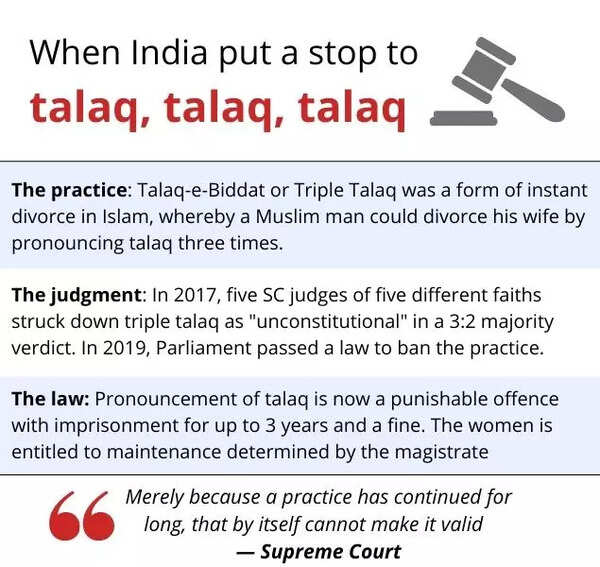
Explained: Why did SC say ‘Talaq-e-Hasan’ is different from triple talaq | India News
[ad_1]
In Islam, a man can take “talaq”, while a woman can part ways with her husband through “khula”.
The top court was hearing a plea seeking to declare ‘Talaq-e-Hasan’ and all other forms of “unilateral extra-judicial talaq as void and unconstitutional”, claiming they were “arbitrary, irrational, and violated fundamental rights”.
Why is this form of divorce subject to controversy and how is it different from the now illegal triple talaq? Here’s a look …
What is Talaq-e-Hasan?
In Talaq-e-Hasan, talaq is pronounced once a month, over a period of three months and if cohabitation does not resume during this period, the divorce gets formalised after the third utterance in the third month.
However, if cohabitation resumes after the first or second utterance of talaq, the parties are assumed to have reconciled. The first and second utterances of talaq are then deemed invalid.
The form of divorce has been subject to criticism over the years. Various petitioners have approached the court to seek its abolishment, saying that “it violates women’s rights”.
What’s the difference between Talaq-e-Hasan and Triple Talaq?
In Islam, there are essentially three forms of divorce: Talaq-e-Ahsan, Talaq-e-Hasan and Talaq-e-biddat. We have already discussed Talaq-e-Hasan.
Talaq-e-Ahsan is said to be the least disapproved way of dissolving a marriage. ‘Ahsan’ means best or most proper. Under Talaq-e-Ahsan, the husband must pronounce divorce in a single sentence when the wife is in a state of ‘purity’, that is, not menstruating.
The divorce is followed by a period of abstinence, known as “iddat”. The duration is ninety days or three menstrual cycles or three lunar months.
If the couple resumes cohabitation or intimacy within the period of iddat, the pronouncement of divorce is treated as having been revoked. Thus, ‘talaq-e-ahsan’ is revocable. On the other hand, if there is no resumption of cohabitation or intimacy during this period, the divorce becomes final and irrevocable.

Talaq-e-biddat is the most controversial form of divorce and was banned by the government in 2019. This can take the form of triple talaq (instant divorce), wherein the husband can pronounce “talaq” thrice in one sitting to divorce his wife. Divorce is thus instant and becomes irrevocable immediately when it is pronounced.
Talaq-e-biddat does not observe the waiting period and irrevocably terminates the marriage.
This form of divorce, though considered valid under Sharia law, is generally disapproved in Islam.
Prima facie this (Talaq-e-Hasan) is not so improper. Women also have an option of Khula
Supreme Court
What does the petitioner want?
The plea filed in the apex court says that Talaq-e-Hasan and other forms of unilateral extra-judicial talaq are neither harmonious with the modern principles of human rights and gender equality, nor an integral part of the Islamic faith.
Petitioner Benazeer Heena, who claims to be a victim of Talaq-e-Hasan, has submitted that though the apex court has declared triple talaq unconstitutional, it left the issue of Talaq-e-Hasan undecided.
The petitioner submitted that her husband had allegedly divorced her by sending a Talaq-e-Hasan notice through a lawyer on April 19 after her family refused to pay dowry, even as her in-laws were harassing her for the same.
She has also sought a direction to the Centre to frame guidelines for neutral and uniform grounds of divorce and procedure for all citizens.
What did the Supreme Court say?
The bench noted that the Talaq-e-Hasan form of divorce is not so improper since women also have an option of Khula, unlike in triple talaq where divorce is instant.
The bench said that courts can grant divorce by mutual consent in case of irretrievable breakdown of marriage.
“This is not triple talaq. You (women) also have option of Khula. If two people cannot live together, we are also granting divorce by irretrievable breakdown of marriage. Are you open to divorce by mutual consent if mehar (gift given in cash or kind by groom to bride) is taken care of,” the bench asked the petitioner.
“Prima facie I don’t agree with petitioners. Let us see. I don’t want this to become an agenda for any other reason,” Justice Kaul said.
The top court asked the petitioner’s lawyer to seek instructions on whether in view of the allegation of the irrevocable breakdown of marriage, would the petitioner be willing to settle by process of divorce on amount being paid over and above ‘mehar’.
It also told the petitioner that dissolution of marriage is also possible without the intervention of this court through ‘mubarat’ and asked her counsel to seek instructions.
The apex court will now hear the matter on August 29.
Notably, a similar plea is also pending before the Delhi high court which had, in June this year, sought responses from the Delhi Police and a Muslim man after his wife filed a petition challenging a Talaq-e-Hasan notice allegedly sent by him.
(With inputs from agencies)
[ad_2]
Source link


